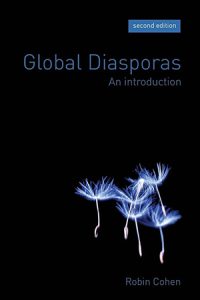Global Diasporas: An Introduction (Second Edition)

Author: Robin Cohen
Publisher: Routledge
Year of Publication: 2008
Print Length: 240 pages
Genre: Non-Fiction / Migration & Refugee Studies, Social Science
Area: Babylon, Palestine/Israel, Atlantic, Bombay (Modern Mumbai), Soviet Union, The Netherlands, France, The United Kingdom (UK), The United States of America (USA)
People: Jews, Armenian, Sikhs, Afro-Caribbean, The Africans
Topic: Diaspora, Social Construct, Social Reconstruction,
Exclusion, Minority Rights, Oppression, Massacre, Slavery, Imperialism, Labor & Contract, Trade, Enterprise, Economy, Zionism, Politics & Power, Local & Global, Globalization, Cosmopolitanism, City & Urban, Development, Creativity, Religion, Judaism, Christianity, Islam, The Notion of Home, Return Migration & The Notion of Return
In a perceptive and arresting analysis, Robin Cohen introduces his distinctive approach to the study of the world’s diasporas. This book investigates the changing meanings of the concept and the contemporary diasporic condition, including case studies of Jewish, Armenian, African, Chinese, British, Indian, Lebanese and Caribbean people.
The first edition of this book had a major impact on diaspora studies and was the foundational text in an emerging research and teaching field. This second edition extends and clarifies Robin Cohen’s argument, addresses some critiques and outlines new perspectives for the study of diasporas. It has also been made more student-friendly with illustrations, guided readings and suggested essay questions.
Table of Contents
List of tables
List of figures
Acknowledgements
Preface to the second edition
1. Four phases of diaspora studies
The prototypical diaspora / The expanded concept of diaspora / Social constructionist critiques of diaspora / The consolidation phase / Conclusion: the tolls to delineate a diaspora / Further reading / Questions to think about
2. Classical notions of diaspora: transcending the Jewish tradition
‘Babylon’ as a site of oppression / ‘Babylon’ as a site of creativity / The Jewish diaspora and Christianity / The Jewish diaspora and Islam / Ashkenazi fates / Conclusion / Further reading / Questions to think about
3. Victim diasporas: Africans and Armenians
Origins of the African diaspora / The African diaspora: homeland and return / Other aspects of the African diaspora / The creation of the Armenian diaspora / After the massacres: Armenians at home and abroad / Soviet Armenia and after / Conclusion / Further reading / Questions to think about
4. Labour and imperial diasporas: indentured Indians and the British
A new system of slavery? / The songs of Ramayana and political outcomes / Imperial diasporas / The settlement of the British Empire / The end of the dominion diaspora / Conclusion / Further reading / Questions to think about
5. Trade and business diasporas: Chinese and Lebanese
The making of the Chinese diaspora / The Chinese as minorities / The great Lebanese emigration / The Lebanese diaspora: butterflies and caterpillars / Conclusion: ethnic entrepreneurs and trade diasporas / Further reading / Questions to think about
6. Diasporas and their homelands: Zionists and Sikhs
Birth traumas: can Israel be a ‘normal’ state? / Israel and the diaspora / The origins of the Sikh diaspora / Sikhs: the lure of homeland / Conclusion / Further reading / Questions to think about
7. Deterritorialized diasporas: the black Atlantic and the lure of Bombay
The Caribbean: migration and diaspora / African-Caribbeans in the USA / African-Caribbeans in the UK / Caribbean peoples in the Netherlands and France / The black Atlantic thesis / Sindhis and Parsis in Bombay / Conclusion / Further reading / Questions to think about
8. Mobilizing diasporas in a global age
Diasporas in a globalized economy / New forms of international migration / Cosmopolitanism, global cities and the bridging role of diasporas / Religion and diasporas / Conclusion / Further reading / Questions to think about
9. Studying diasporas: old methods and new topics
How and why do typologies work? / Comparing diasporas’ Wittgenstein’s rope / Diasporas as agents of development / The role of diasporas in international politics / Negative reactions to the growth of diasporas / Final remarks / A literature guide / Questions to think about
Notes
References
Index

Robin Cohen is Emeritus Professor and Former Director of the International Migration Institute, University of Oxford. He is Senior Research Fellow at Kellogg College. He has held full professorships at the Universities of the West Indies and Warwick and taught also at the Universities of Ibadan, Birmingham, Stanford, Toronto and Berkeley. He served as Dean of Humanities at the University of Cape Town (2001/3) and directed the nationally designated UK Centre for Research in Ethnic Relations at Warwick (1985/9). His books include Labour and Politics in Nigeria (1974, rev. 1982), Endgame in South Africa? (1986), The New Helots: Migrants in the International Division of Labour (1987, 2023), Frontiers of Identity: The British and the Others (1994), Global Diasporas: An Introduction (1997, rev. 2008, 2012), Global Sociology (co-author, 2000, 2013), Migration and its Enemies (2006). and Encountering Difference (co-author 2016) and Migration: The Movement of Humankind from Prehistory to the Present (2019). He has edited or co-edited 21 further volumes, particularly on the sociology and politics of developing areas, ethnicity, international migration, transnationalism and globalisation. His major works have been translated into Chinese, Danish, French, German, Greek, Italian, Japanese, Korean, Portuguese, Slovenian and Spanish. With Nicholas Van Hear, he is currently working on issues of mass displacement and a history of migration studies at Oxford
Source: https://www.qeh.ox.ac.uk/people/robin-cohen
More from Robin Cohen in this library, click here.
